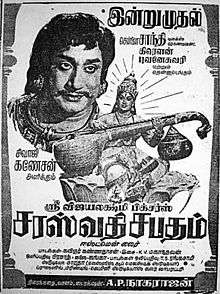Saraswati Sabatham
| Saraswati Sabatham | |
|---|---|
 | |
| Directed by | A. P. Nagarajan |
| Produced by | A. P. Nagarajan |
| Written by | A. P. Nagarajan |
| Starring |
Sivaji Ganesan Gemini Ganesan K. R. Vijaya Savitri Devika Padmini Manorama Nagesh |
| Music by | K. V. Mahadevan |
| Cinematography | K. S. Prasad |
| Edited by |
M. N. Rajan T. R. Natarajan |
Production company |
Sri Vijayalakshmi Pictures |
| Distributed by | Sri Vijayalakshmi Pictures |
Release date | 3 September 1966 |
Running time | 148 mins |
| Country | India |
| Language | Tamil |
Saraswati Sabatham (English: Saraswati's Challenge) is a 1966 Indian Tamil mythological film written and directed by A. P. Nagarajan. It stars Sivaji Ganesan, Gemini Ganesan, Savitri,[1] Devika, Padmini, K. R. Vijaya, Manorama and Nagesh. This film was also dubbed into Telugu with the same title.
Plot
Saraswati Sabatham is about the story of a dispute between three goddesses and who is the most powerful of them all. Narada (Sivaji Ganesan), a sage and celestial troublemaker, begins the argument by visiting Saraswati (Savitri), the Goddess of knowledge, and annoys Her on purpose by saying that wealth is more important and abundant. Angered by this, Saraswati states She will prove that knowledge is more important. Narada then goes to Vaikuntha to see Lakshmi (Devika), the Goddess of wealth, and says that knowledge is more abundant. Lakshmi also retorts She will prove that wealth is more important. Narada finally goes to Mount Kailash, seeking Parvati (Padmini), the goddess of strength, and annoys Her too by saying that wealth and knowledge are more important. Parvati too stresses that strength is more important.
Each of the three Goddesses, having been turned against one another by Narada, decide to choose someone on earth and bless them with their respective powers so that each of them can prove their power is the most important and make the other two Goddesses lose. Saraswati blesses a mute person, Vidyapati (Ganesan again), by imparting to him all the knowledge in the world and bestows upon him the gift of speech. The king of Vidyapati's kingdom is dying and does not have any children. He orders his minister to send the royal Elephant into the streets with a garland and the person whose neck the Elephant puts the garland on will be his successor. Lakshmi makes the royal Elephant put the garland on a beggar girl, Selvambigai (K.R. Vijaya), thus making her wealthy. Parvati blesses Veeravallan, a man who has been a coward his whole life (Gemini Ganesan), with the gift of strength.
Vidyapati and Selvambigai happen to meet one another at a temple and get into a heated argument about their respective qualities bestowed on them. Vidyapati finds her too arrogant because of her wealth while Selvambigai finds him egotistical due to his knowledge and both leave the temple in a huff. Selvambigai thinks about her argument Vidyapati and loses control over her horses. Veeravallan spots her and saves her from a near fatal accident. Impressed with his bravery, she makes him the commander-in-chief of the kingdom's army. Selvambigai is impressed by Vidyapati's knowledge as well and decides to make him the kingdom's head poet as she feels his knowledge could be useful for the kingdom's reputation.
Selvambigai spends too much of her time engaging in a battle of wits with Vidyapati, which makes Veeravallan believe that she is neglecting her royal duties. He instigates his soldiers into rebellion and puts Vidyapati in prison. Selvambigai secretly goes to the prison and asks him sing in her praise so as to guarantee his freedom; Vidyapati rejects the offer and instead sings in a manner that insults her. Veeravallan learns of the meeting and puts Selvambigai in prison, orders the execution of both her and Vidyapati, and declares himself the kingdom's ruler. The Gods of the Holy Trinity, Shiva (Haranath), Vishnu (Sivakumar) and Brahma (Sarangkapani) settle the dispute by explaining the importance of knowledge, wealth, and strength combined, and how dangerous it is if each of them are bestowed on human beings separately. Finally, the three Goddesses reconcile and Vidyapati, Selvambigai and Veeravallan realise the importance of wealth, knowledge and strength.
Cast
- Sivaji Ganesan as Vidyapati and Narada
- K.R. Vijaya as Selvambigai
- Gemini Ganesan as Veeravallan
- Savitri as Saraswati
- Devika as Lakshmi
- Padmini as Parvati
- Sivakumar as Vishnu
- Manorama
- Nagesh
- K. Sarangkapani as Brahma
- Haranath as Shiva
Soundtrack
| Saraswathi Sabatham | |
|---|---|
| Soundtrack album by K. V. Mahadevan | |
| Released | 1966 |
| Label | Bell Records |
| Producer | K. V. Mahadevan |
The music composed by K. V. Mahadevan.[2][3]
| No. | Song | Singers | Lyrics | Length (m:ss) |
| 1 | Agaramuthala | T. M. Soundararajan | Kannadasan | 03:10 |
| 2 | Deivam Iruppathu Engey | T. M. Soundararajan | 03:32 | |
| 3 | Kalviya Selvama Veerama | T. M. Soundararajan | 03:37 | |
| 4 | Komatha Engal Kulamatha | P. Susheela | 07:42 | |
| 5 | Rani Maharani | T. M. Soundararajan | 03:12 | |
| 6 | Thai Thantha | P. Susheela | 03:29 | |
| 7 | Uruvathaikattidum Kanaadi | P. Susheela | 03:40 |
References
- 1 2 citwf.com, Saraswati Sabatham cast/crew listing at The Complete Index to World Film since 1895, Retrieved 10-13-2008
- ↑ "Saraswati Sabatham Songs". raaga. Retrieved 2014-06-14.
- ↑ musicindiaonline.com, soundtrack listing for Saraswati Sabatham, Retrieved 10-13-2008